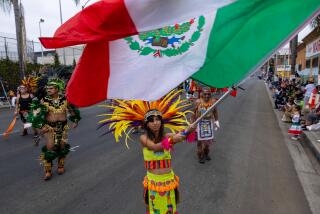More Thoughts on the Observance of Cinco de Mayo
- Share via
Re “Aren’t You Just Sicko de Mayo?” by Paul Rodriguez (May 5): The Battle of the Puebla in which the Mexican army soundly defeated the French army of Napoleon III took place on the fifth of May 1862, not 1875.
The war between the French invader and the Mexican people went on for five more heartbreaking years of blood spilling and suffering. Instead of just kicking mestizo behinds, as Rodriguez quaintly puts it, the disciplined expeditionary force of Napoleon III and the allied troops of the Mexican Conservative Party faced a determined foe that finally defeated the proclaimed best soldiers in the world and executed Emperor Maximilian.
It wasn’t the United States that drove the French out of Mexico. What motivated the withdrawal was the five years of incessant armed confrontation, the constant harassment of guerrilla warfare, the repudiation of the civilian population and the thousands upon thousands of Mexicans who gave their lives for la patria.
People living in Mexico do observe and celebrate Cinco de Mayo. The date is a cornerstone in the history of Mexico. It symbolizes the decision of a nation to conserve its own identity, liberty and self-determination.
Under what circumstances the people in this country celebrate the fifth of May or on what particular dates, those are matters concerning the people of this country. I have just stated what Cinco de Mayo really is.
JOSE PESCADOR
Consul General of Mexico
Los Angeles
Comedians make bad historians. Paul Rodriguez tells us the Battle of the Puebla occurred in 1875 when it, in fact, happened in 1862.
He then goes on to tell us that the holiday was basically invented by the Cal State Los Angeles faculty. In reality, the holiday has been celebrated in the Southwest since 1863, a year after the brawl between French troops and Mexican peasants.
Later, he tells us that the Americans rid Mexico of the French. No, the U.S. invaded Mexico in 1847 and then rid it of its land in the north.
The significance of Cinco de Mayo is that ethnic Mexicans in the Southwest have looked to the triumph of their southern brethren over European imperialism for inspiration in their daily struggle against what some perceived as North American conquerors. Rodriguez serves to obscure the legacy of conquest and struggle that ethnic Mexicans and indeed all disenfranchised people have experienced.
ERNESTO CHAVEZ
Santa Barbara
Chavez is an assistant professor of history at the University of Texas, El Paso, and a 1997-98 visiting research fellow at UC Santa Barbara’s Center for Chicano Studies.
*
I am an American of Mexican descent and proud of my heritage. I thoroughly agree with Paul Rodriguez. The fifth of May holiday has become a business gimmick. Merchants, beer companies and others make money, so, like every holiday, the real meaning is lost.
Much would be gained if we spent some time at the library to study Mexican history or attended cultural events.
Our Mexican culture begins at home. We do not need a big fiesta to emphasize anything.
ESTHER RODARTE
Los Angeles
*
I couldn’t agree more with the article by Paul Rodriguez. Just like most holidays, Cinco de Mayo has become an excuse to be loud and act foolish. That’s life, I suppose, and I understand, but it brings us down culturally.
Believe me, when Cinco de Mayo became a holiday in the late 1960s during the Chicano movement, it was not intended to be what it has now become--the defining day when the media finally decided that we have monetary value too--that, surprise of all surprises, Latinos have money and spend money just like everyone else.
I have heard the argument that Cinco de Mayo is a way to help us bridge a cultural gap. Maybe when it started, it was. Personally, I have never owned a sombrero or owned a talking Chihuahua, but I know people on this holiday who claim that they do, and I’m not so sure I find any of my cultural pride in that.
Look at all we have to offer, from the artwork of Frida Kahlo and Diego Rivera to the writings of Rudolfo Anaya, Gary Soto and Sabine Ulibarri to the comedy of Paul Rodriguez, who shows us the humor, dignity and honor in just being ourselves.
ANNAMARIA TAFOYA
Hollywood
More to Read
Sign up for Essential California
The most important California stories and recommendations in your inbox every morning.
You may occasionally receive promotional content from the Los Angeles Times.













